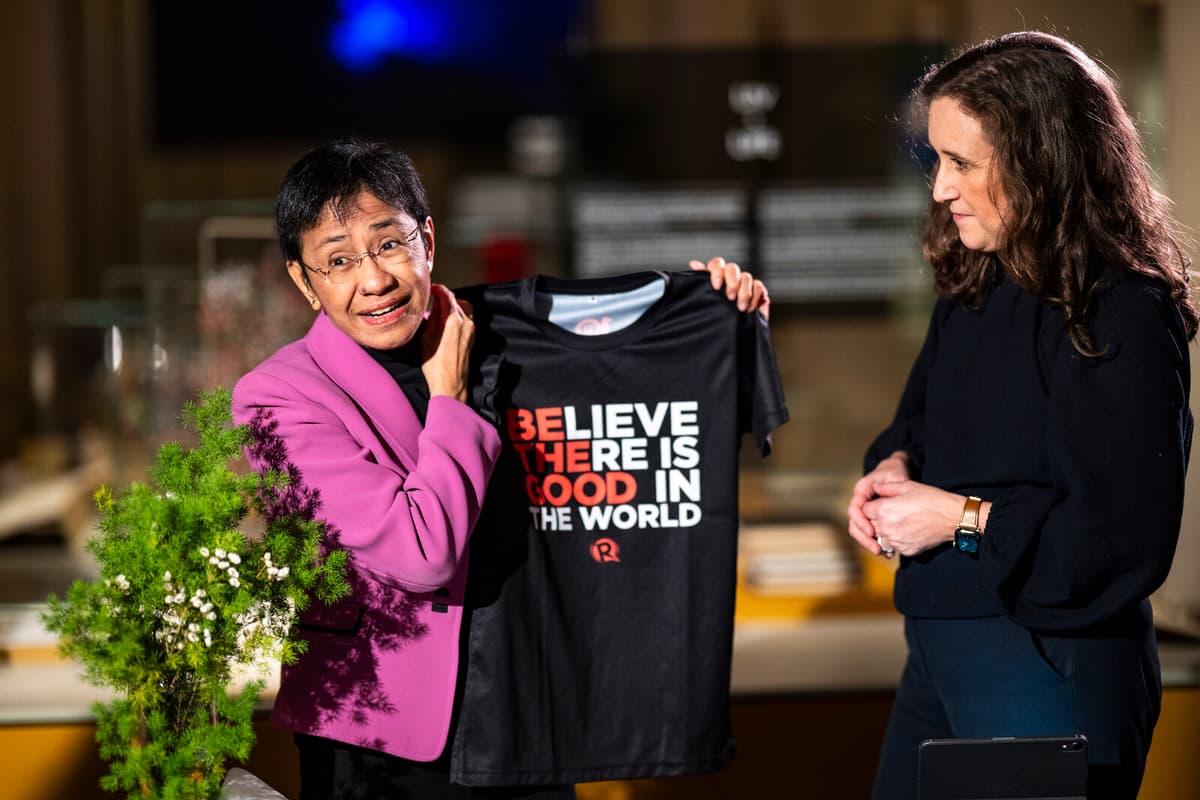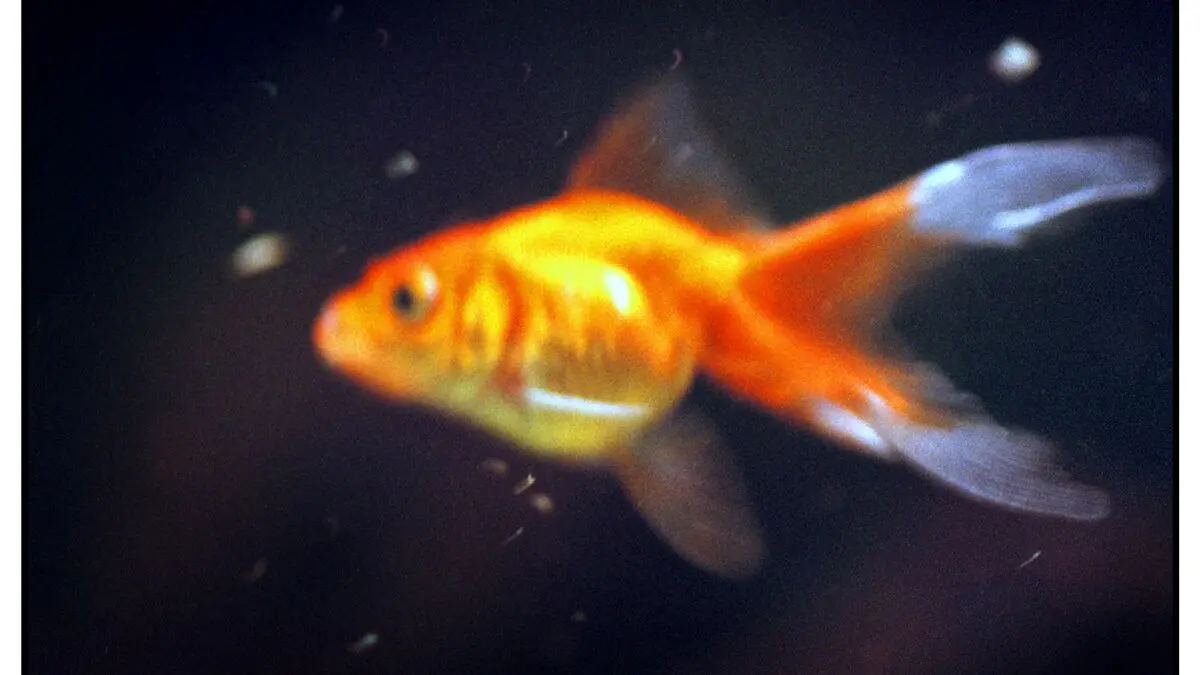The first target is the media, journalists. . . . Next is the academic world and then civil society organizations. In the USA, everything is happening at the same time now.
Filipino-American Ressa speaks with intensity. She is a freedom of speech fighter and co-founder of the news site Rappler, which, among other things, investigated the authoritarian Duterte's regime after his inauguration in 2016. Rappler examined what President Duterte claimed was a war on drugs, which led to the killing of thousands of people with real or alleged links to drug trafficking. The actions led to the International Criminal Court's (ICC) arrest of him in March.
I still have to ask the Supreme Court in my home country for permission to travel, says Maria Ressa.
But I am here, and the former president is (in custody) with the ICC in The Hague, she says in connection with her, like all winners, leaving a personal gift to the Nobel Museum in Stockholm, things that will later become part of the exhibition.
Advertisement
Attacked online
Ressa's gift is two Rappler T-shirts with the text "Believe there is good in the world" (approximately "believe in the good in the world") and a video showing when she was arrested by the police for the first time. The arrest took place at the editorial office in Manila in 2019 – and was repeated nine times.
In 2021, she received the Nobel Peace Prize together with Dmitrij Muratov, co-founder of the Russian newspaper Novaja Gazeta. The following year, Rodrigo Duterte resigned. However, this did not make Maria Ressa's life much easier. Rappler's business license was revoked, a decision she appealed. She herself disputes a number of legal charges, now primarily a case involving online libel. At the same time, she teaches at Columbia University in New York and leads Rappler.
When Duterte was arrested at the airport in Manila on March 11 this year, Ressa was at Rappler's editorial office.
We were the first with the story, we have followed his fall for eternity, she says.
Advertisement
But as soon as we published the news, we were attacked online. We were attacked, and people wrote that we were wrong. The disinformation made many Filipinos confused.
Impunity for tech?
Disinformation campaigns are no longer unusual in the global media landscape. Maria Ressa cites a study from MIT (Massachusetts Institute of Technology) that shows that lies spread several times faster than facts on social media. One reason she became a target for the Duterte regime was that she tracked the means used to spread falsehoods on the internet, she claims.
One of the big questions being discussed now is whether we are still in a rule-based world order. In large part, I think so, when it comes to governments and leaders like Vladimir Putin's and Benjamin Netanyahu's. But the tech sector enjoys impunity, despite the fact that these companies are largely the reason we are here.
The Peace Prize winner believes that the leading tech companies "manipulate the world's democracies at a cellular level" and thereby pose a threat to truth and freedom of speech. She links this to the development of hard-line leaders like Trump and Viktor Orbán being elected democratically.
Europe will be pressed hard by the companies to lift data protection regulations like GDPR. But it is they who keep us safe. It is possible to be innovative without breaking the law, she says.
At a crossroads
Maria Ressa was born in the Philippines but grew up partly in New Jersey on the US East Coast. The first months of Donald Trump's second term have been trying for her.
The development is identical to that in the Philippines when Duterte came to power. It took him six months to crush the democratic institutions and create a society of fear. See what President Trump has done in his first two, she says.
The US population is now at a crossroads, where citizens must stand up for their values, democracy, and the rule of law, she reasons.
Is it okay that a Turkish student is arrested by masked police for participating in a demonstration? And the "Signal-gate" (when Trump's administration's attack plans against Yemen leaked to a journalist) – what happens when people appointed to uphold the law break it?
Remains destroyed?
Within the Democrats in the USA, many are now advocating for a restart after the autumn's loss to Trump and the Republicans in Congress, a process they say will take time. The goal is set on the midterm election in 2026. But Maria Ressa believes it is urgent.
What we learned in the Philippines is that if you don't stand up for your rights from the beginning, it's not certain you'll get them back. What gets destroyed remains destroyed. For example, Duterte threatened the country's largest TV channel and revoked its broadcasting rights. Now he's gone, but the channel still can't broadcast.
Despite the development, Ressa is hopeful. She talks about the pro-democratic protests in Georgia and student activists in Serbia. And in The Hague, 78-year-old Rodrigo Duterte is being investigated for ordered murders from 2011, when he was mayor of the city of Davao, until 2019.
According to prosecutors, Duterte's campaign, which he himself dubbed a "war on drugs," was part of a "comprehensive and systematic attack on the civilian population." Filipino police have reported that over 6,000 people were killed, while human rights groups claim that the number may be as high as 30,000.
It's strange that the Philippines contribute to upholding the international justice system while the Trump administration seems to be doing everything it can to dismantle it, says Ressa.
Tina Magnergård Bjers/TT
Facts: Maria Ressa
TTTT
Maria Ressa is a journalist and one of the Philippines' most well-known advocates for freedom of speech. She was born in 1953 in Manila, grew up partly in New Jersey in the USA.
Has a degree in English from the prestigious Princeton University and has also studied and taught in the Philippines.
Has been named Person of the Year by Time magazine, was CNN's bureau chief in Jakarta, and covered a number of conflicts before co-founding the news site Rappler in 2012.
Rappler is a digital media company for investigative journalism that has focused on, among other things, investigating the former President Rodrigo Duterte's regime and its human rights abuses.
In 2021, Ressa received the Nobel Peace Prize together with Russian Dmitrij Muratov, co-founder of the newspaper Novaja Gazeta. Previously, she has received, among other things, the Swedish Publicist Club's prize in memory of Anna Politkovskaya and the Swedish PEN Tucholsky Prize.






